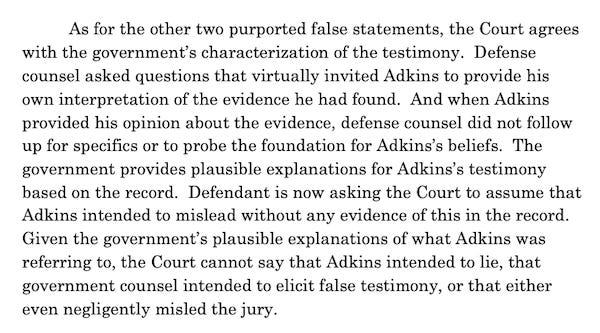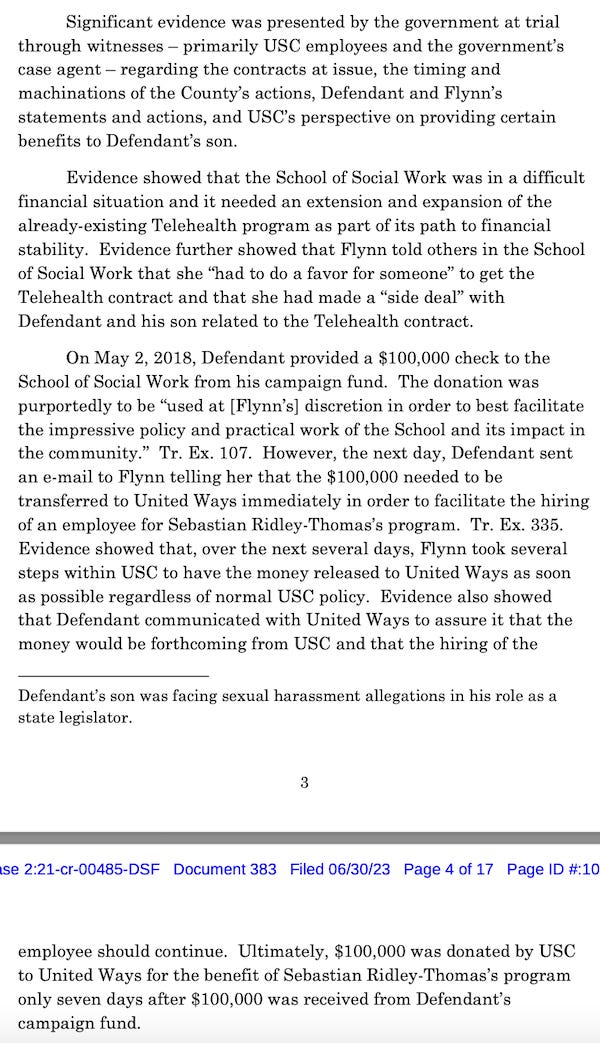Judge rejects new trial for Los Angeles politician Mark Ridley-Thomas in USC bribery scheme
The order describes 'substantial evidence' presented in Ridley-Thomas' trial and clears the way for his sentencing, currently scheduled for Aug. 21.
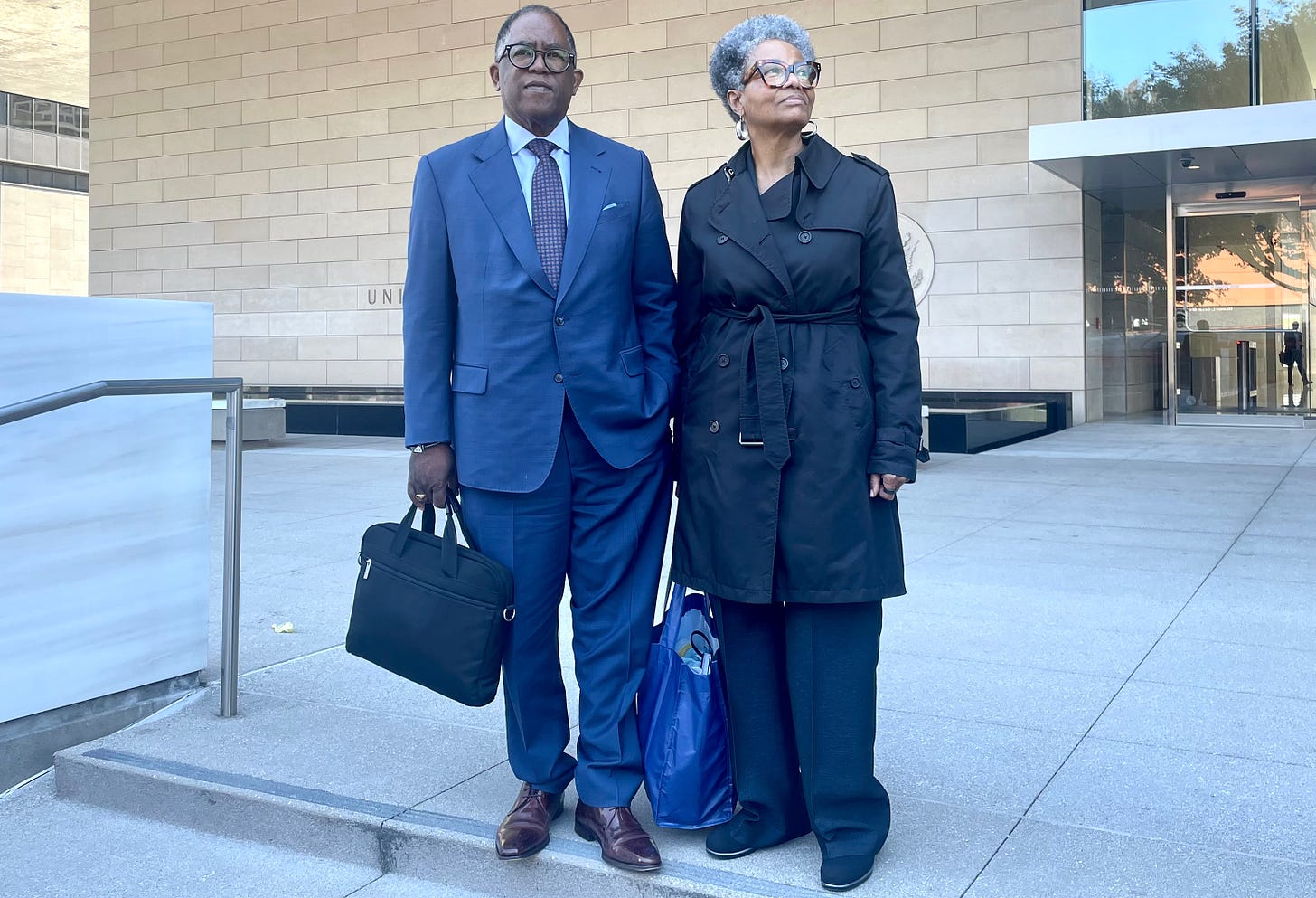
A federal judge on Friday rejected a new trial or a judgment of acquittal for longtime Los Angeles politician Mark Ridley-Thomas in his bribery conspiracy involving the University of Southern California, calling the evidence of his corrupt intent “substantial.”
The 17-page ruling rejects each error alleged by Ridley-Thomas’ lawyers, including their argument that the lead FBI agent lied in his testimony and wrongly vouched for the validity of the case along with prosecutors. It also says prosecutors’ use of the word “funneling” to describe Ridley-Thomas moving campaign money to USC “arguably fairly characterized what happened.”
“Ultimately, $100,000 was donated by USC to United Ways for the benefit of Sebastian Ridley-Thomas’s program only seven days after $100,000 was received from Defendant’s campaign fund,” Judge Fischer wrote.
She said Ridley-Thomas’ corrupt intent is “is demonstrated by the way Defendant characterized his donation to USC as being important to support the School of Social Work, even though he knew that it would immediately be sent to United Ways.”
“It is also demonstrated by the general circumstances of the communications between Defendant and Flynn if inferences are drawn in the light most favorable to the prosecution,” according to the order, which says the $100,000 was the motive for the briery, not basis for charge itself. “Viewed in the light most favorable to the prosecution, the jury could easily find that Defendant knew he was acting corruptly and dishonestly in structuring the $100,000 donation in return for his assistance with the Telehealth contract.” That contract lucratively looped in Flynn’s school at a time of great financial need.
“Flynn was alleged to have needed to bring in more funds for the School of Social Work, both to improve the school’s financial viability and to promote her own career,” Fischer wrote.
The order clears the way for Ridley-Thomas’ sentencing, which is scheduled for Aug. 21 in Fischer’s Los Angeles courtroom. The 68-year-old was stripped of his elected position on the Los Angeles City Council after his convictions, which were for crimes in 2017 and 2018 when he was an elected member of the Los Angeles County Board of Supervisors.
He’s not currently in custody.
Federal sentencing guidelines show he faces at least several years in prison for his bribery, conspiracy and honest services mail fraud convictions. His political position on the Los Angeles County Board of Supervisors at the time of the crimes brings a base offense level of 18, which gives him a starting standard range of 27 to 33 months in prison.

But prosecutors also will consider his wire fraud convictions, and there may be other factors that increase their calculated base offense level.
They’ll lay out their position in a memorandum due in the weeks before sentencing, as will Ridley-Thomas’ attorneys.
First, prosecutors are preparing for the July 24 sentencing of Marilyn Flynn, the 84-year-old dean emeritus of the USC School of Social Work. Flynn pleaded guilty to a bribery charge in September 2022; prosecutors agreed to recommend she pay a fine of $100,000 and avoid prison. She did not testify in Ridley-Thomas’ trial.
Prosecutors haven’t yet filed their memorandum, but they revealed in a filing last week that the U.S. Probation Office believes Flynn’s crime was victimless and that restitution can’t be imposed.
Assistant U.S. Attorney Lindsey Greer Dotson said that’s not true.
“Businesses, corporations, and non-profit organizations can be eligible victims,” Dotson wrote in her objection to the office’s presentence report. “The victims here include the citizens of Los Angeles County, United Ways of California, and University of Southern California.”
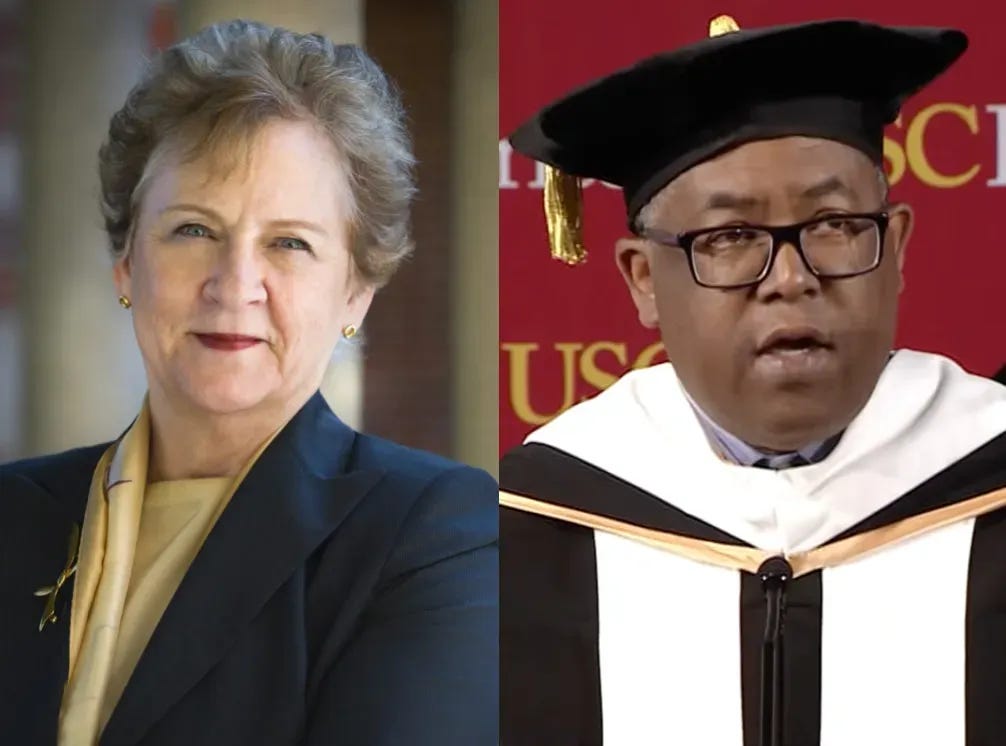
Jurors deliberated nearly five days before convicting Ridley-Thomas on March 30 of single counts of bribery and conspiracy, as well as four counts of honest services wire fraud and a single count of honest services mail fraud.
The convictions related to Ridley-Thomas’ donation of $100,000 in campaign money to USC in conjunction with Flynn donating $100,000 in USC’s money to United Way for his son Sebastian’s new policy initiative.
Sebastian had recently resigned from his elected California State Assembly position amid a sexual harassment investigation; prosecutors said his father was concerned about securing him a respectable public landing position.
Jurors couldn’t agreed that Sebastian’s USC admission, scholarship and professorship were part of Ridley-Thomas’ conspiracy with Flynn, which resulted in not guilty verdicts for one count of honest services mail fraud and 11 counts of honest services wire fraud because those counts were related to the scholarship and job.
Ridley-Thomas’ lawyers at Morrison & Foerster LLP argued Fischer should vacate his convictions and order a new trial because of false testimony by the FBI agent and prosecutorial misconduct that wrongly interjected opinion into argument while vouching for the case’s credibility. They also filed a separate motion for acquittal arguing prosecutors didn’t present evidence to support the convictions.
Prosecutors replied saying the evidence is “far more than sufficient” and defending the testimony of FBI Special Agent Brian Adkins, who was the lead investigator on Ridley-Thomas’ case and currently is stationed in Orange County investigating corruption related to the failed Angel Stadium of Anaheim development deal.
They pointed out that Ridley-Thomas’ lawyers didn’t object in trial to several issues they were now raising post-trial. They also rejected arguments that they unfairly maligned the defense, saying they’d only “permissibly critiqued defendant’s tactics and arguments.”
Fischer’s order backs them up in all areas.
It rejects all arguments that Adkins intentionally misled jurors when he initially testified that he’d reviewed all 400,000 documents produced by prosecutors, then said he and another agent reviewed them. Fischer said the curative jury instruction drawing attention to Adkins’ inconsistent statement “was sufficient to remedy any prejudice.” She also agreed with prosecutors regarding other testimony the defense said was misleading, saying it was elicited by the defense without follow up.
“Defense counsel asked questions that virtually invited Adkins to provide his own interpretation of the evidence he had found,” Fischer wrote. “And when Adkins provided his opinion about the evidence, defense counsel did not follow up for specifics or to probe the foundation for Adkins’s beliefs.”
Fischer also rejected the defense’s argument that Assistant U.S. Attorney Michael Morse unfairly insulted them when he said in his rebuttal that the defense’s closing PowerPoint presentation “was represented as testimony in the form of a transcript” and might “even be incorrect.”
“Government counsel’s ultimately fair and accurate point, even if it could have been worded more artfully, did not impugn counsel or unfairly prejudice Defendant,” Fischer wrote.
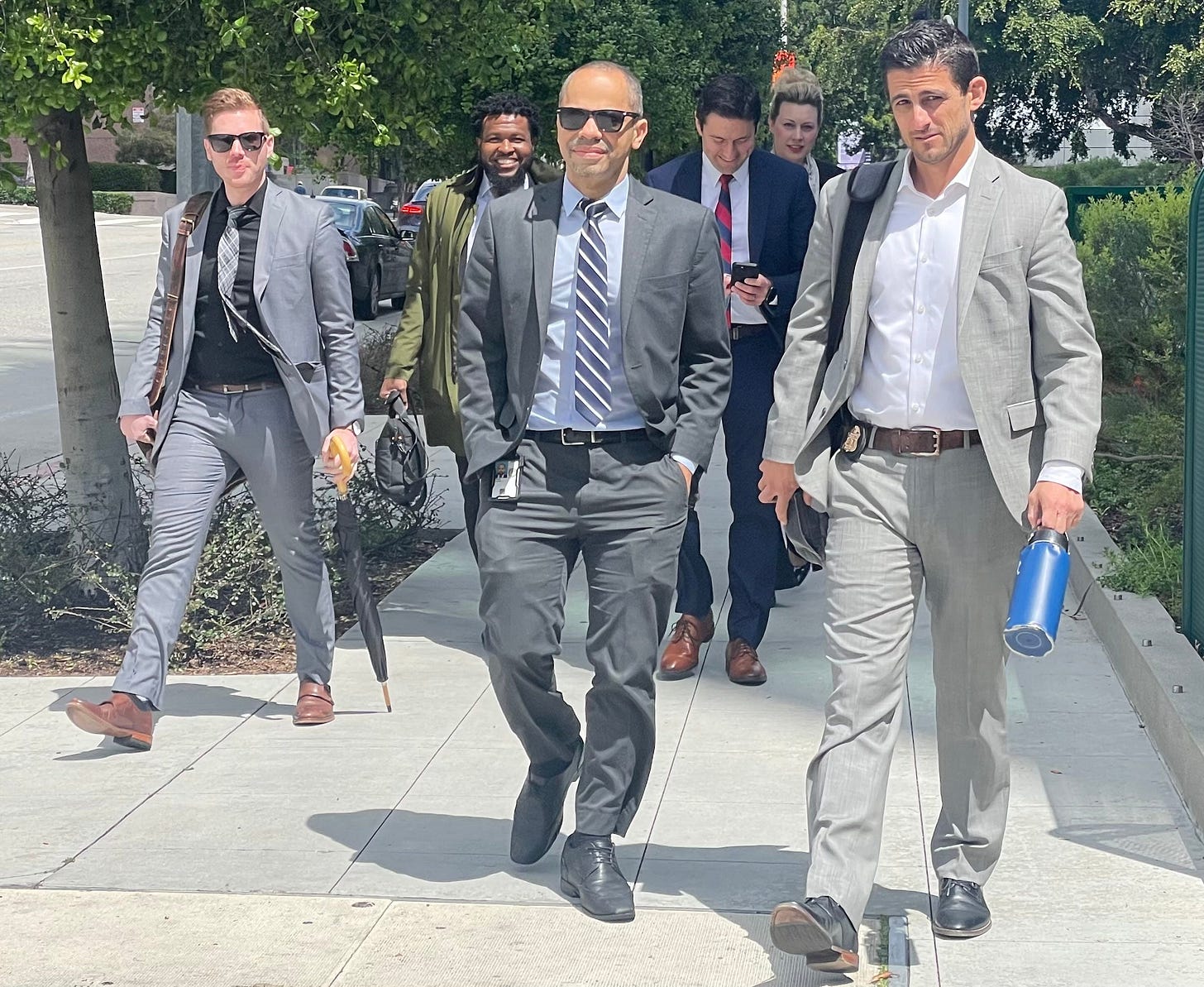
Fischer also defended Dotson’s use of the term “manufactured defense” in her closing, saying it “clearly refers to the government’s position that Defendant’s explanation of the facts was self-serving and not a reasonable interpretation of the evidence presented at trial.”
“A reasonable juror would not have viewed it as an accusation that defense counsel was lying or otherwise personally intended to mislead the jurors regarding the evidence,” according to the order. “And even if the government could have chosen different words, a single use of the fairly benign and easily understood rhetoric of ‘manufactured defense’ could not and did not affect the outcome of the trial.”
The judge also said statements about Ridley-Thomas trying to conceal his actions for fear of prosecution and characterizing testimony as seeming to be “crazy” or “nonsense” while other evidence is “crystal clear” “are easily within the range of acceptable argument and comment on the evidence.”
Fischer wrote in a footnote, “The other statements Defendant objects to are even more clearly acceptable comments on the evidence – so much so that it is difficult to understand what the objection is supposed to be.”
A public relations specialist hired by Ridley-Thomas did not immediately respond to a request for comment on Friday.
More than 100 of Ridley-Thomas’ supporters packed Fischer’s courtroom on Monday for a hearing on the motions, according to the Los Angeles Times. The night before, his spokesman emailed reporters to point out perceived inaccuracies in press reports about his convictions.
He pointed out that Ridley-Thomas was not convicted of crimes related to Sebastian’s scholarship or professorship.
“A shorter and more accurate summary is as follows:
‘Former Councilmember Mark Ridley-Thomas was convicted in March on federal bribery, conspiracy and honest services mail and wire charges for steering county contracts to USC in exchange for contributions to a community-focused non-profit organization. Ridley-Thomas is appealing the conviction.’”
The email also said: “Ironically, even the federal government agreed that MRT’s $100,000 contribution to USC was not illegal and his expert witness, Ann Ravel, testified to this during the trial.”
Fischer acknowledges this in her order.
“Government counsel did make the statement that the fact that the ‘funneling’ did not violate campaign finance laws ‘seems crazy,’ but she did not contest that the ‘funneling’ was actually legal,” Fischer said.
But the judge’s order makes the point that the case is about more than the legality of the singular act of Ridley-Thomas donating to USC. Fischer said prosecutors presented “significant evidence…about the contracts at issue, the timing and machinations of the County’s actions, Defendant and Flynn’s statements and actions, and USC’s perspective on providing certain benefits to Defendant’s son.”
“Evidence showed that the School of Social Work was in a difficult financial situation and it needed an extension and expansion of the already-existing Telehealth program as part of its path to financial stability,” according to the order. “Evidence further showed that Flynn told others in the School of Social Work that she ‘had to do a favor for someone’ to get the Telehealth contract and that she had made a ‘side deal’ with Defendant and his son related to the Telehealth contract.”
Read the full order here and please consider purchasing a subscription to support my work. Other documents are available below for paid subscribers. You can find all my coverage of the trial here.



